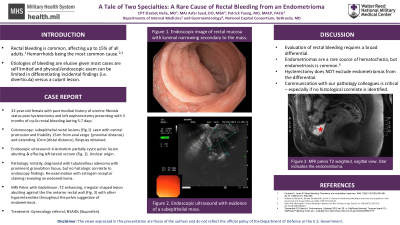Monday Poster Session
Category: GI Bleeding
P2482 - A Tale of Two Specialties: Rare Cause of Rectal Bleeding From an Endometrioma
Monday, October 28, 2024
10:30 AM - 4:00 PM ET
Location: Exhibit Hall E

Has Audio

Elsabet Haile, MD
Walter Reed National Military Medical Center
Bethesda, MD
Presenting Author(s)
Elsabet Haile, MD, Azfar S. Syed, DO, MBA, Patrick Young, MD
Walter Reed National Military Medical Center, Bethesda, MD
Introduction: Rectal bleeding is a common symptom with a broad differential that can vary from life threatening causes to benign distal etiologies such as anal fissures. Here, we present a case of a rectal endometrioma mimicking a rectal subepithelial lesion.
Case Description/Methods: A 32-year-old female with a history of anemia secondary to complex uterine fibroids status post hysterectomy in June 2023 developed self-limited episodes of abdominal/rectal pain and cramping in August 2023. In November 2023, she developed hematochezia. These episodes would self-resolve after several days with the use of non-steroidal anti-inflammatory drugs (NSAIDs). During an overseas military rotation in Poland, she was hospitalized for these symptoms and underwent a diagnostic colonoscopy. A suspected subepithelial lesion was found in her rectum and biopsied with a bite on bite approach. Her final pathology never returned, but her treating gastroenterologist favored a Gastrointestinal Stromal Tumor (GIST). She was evacuated to Walter Reed (WR) for further management. Her repeat colonoscopy revealed the same subepithelial mass. However, evaluation with endoscopic ultrasound (EUS) showed likely an extrinsic mass rather than a mural lesion. Initially, pathology entertained the lesion being a tubulous adenoma, but with the added history cyclical rectal pain and the lesion being extrinsic to the colon; an estrogen receptor stain was added which confirmed the diagnosis of endometrioma. The patient was referred to gynecology with cross-sectional imaging being obtained for definitive treatment.
Discussion: Rectal bleeding secondary to an endometrioma is a very rare source of hematochezia, but one which should be considered in menstruating patients, particularly those with cyclical rectal pain. In our patient, her history of a prior hysterectomy caused her to have amenorrhea, which added to the difficulty in diagnosis. Gastroenterologist should clearly communicate the relevant clinical history to the pathologists so the relevant stains can be ordered to make this diagnosis. Given that the prevalence of endometriosis is about 10%, this is a diagnosis that should be on every gastroenterologist’s radar.
Disclosures:
Elsabet Haile, MD, Azfar S. Syed, DO, MBA, Patrick Young, MD. P2482 - A Tale of Two Specialties: Rare Cause of Rectal Bleeding From an Endometrioma, ACG 2024 Annual Scientific Meeting Abstracts. Philadelphia, PA: American College of Gastroenterology.
Walter Reed National Military Medical Center, Bethesda, MD
Introduction: Rectal bleeding is a common symptom with a broad differential that can vary from life threatening causes to benign distal etiologies such as anal fissures. Here, we present a case of a rectal endometrioma mimicking a rectal subepithelial lesion.
Case Description/Methods: A 32-year-old female with a history of anemia secondary to complex uterine fibroids status post hysterectomy in June 2023 developed self-limited episodes of abdominal/rectal pain and cramping in August 2023. In November 2023, she developed hematochezia. These episodes would self-resolve after several days with the use of non-steroidal anti-inflammatory drugs (NSAIDs). During an overseas military rotation in Poland, she was hospitalized for these symptoms and underwent a diagnostic colonoscopy. A suspected subepithelial lesion was found in her rectum and biopsied with a bite on bite approach. Her final pathology never returned, but her treating gastroenterologist favored a Gastrointestinal Stromal Tumor (GIST). She was evacuated to Walter Reed (WR) for further management. Her repeat colonoscopy revealed the same subepithelial mass. However, evaluation with endoscopic ultrasound (EUS) showed likely an extrinsic mass rather than a mural lesion. Initially, pathology entertained the lesion being a tubulous adenoma, but with the added history cyclical rectal pain and the lesion being extrinsic to the colon; an estrogen receptor stain was added which confirmed the diagnosis of endometrioma. The patient was referred to gynecology with cross-sectional imaging being obtained for definitive treatment.
Discussion: Rectal bleeding secondary to an endometrioma is a very rare source of hematochezia, but one which should be considered in menstruating patients, particularly those with cyclical rectal pain. In our patient, her history of a prior hysterectomy caused her to have amenorrhea, which added to the difficulty in diagnosis. Gastroenterologist should clearly communicate the relevant clinical history to the pathologists so the relevant stains can be ordered to make this diagnosis. Given that the prevalence of endometriosis is about 10%, this is a diagnosis that should be on every gastroenterologist’s radar.
Disclosures:
Elsabet Haile indicated no relevant financial relationships.
Azfar Syed indicated no relevant financial relationships.
Patrick Young: Elements Endoscopy – Consultant.
Elsabet Haile, MD, Azfar S. Syed, DO, MBA, Patrick Young, MD. P2482 - A Tale of Two Specialties: Rare Cause of Rectal Bleeding From an Endometrioma, ACG 2024 Annual Scientific Meeting Abstracts. Philadelphia, PA: American College of Gastroenterology.

